Learn
The Rationale
Imperialism
What is imperialism or expansionism? The definition back in the late 1800s to early 1900s would probably vary depending on whether you asked a person who was pro-imperialist or anti-imperialist. The pro-imperialist would likely define imperialism as an effort to expand the nation's territory to prevent falling behind other nations in a race to become more powerful. On the other hand, an anti-imperialist would define imperialism as a larger nation using its power to dominate a weaker nation completely, including militarily, economically, politically, and culturally.
In the race for world power, countries across the globe challenged each other to conquer any and all available" territory. Notice, there were only a few independent nations left in Africa by 1914.
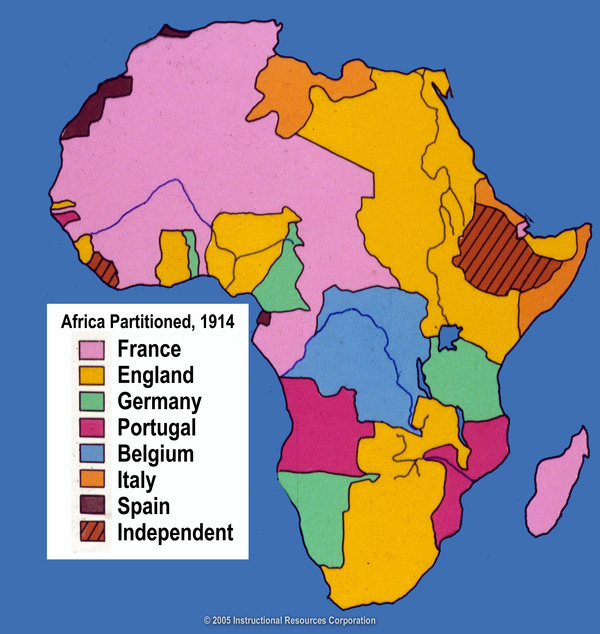
Pro-Imperialist Rationale
The imperialist (expansion) mindset consumed many Americans for a variety of reasons. Whether motivated by economic, humanitarian, religious, nationalist, or military reasons, supporters of imperialism were determined to expand American influence across the globe.
- Economic Motives: Industrialists argued new territories would provide new markets for their manufactured goods and an opportunity to acquire more natural resources for manufacturing.
- Military Motives: New territories would provide bases across the globe needed of national defense to supply protection for already acquired interests and to supply fuel to growing navies.
- Nationalist Motives: The race throughout Europe to acquire new territory sharpened rivalries and the competition to become one of the biggest and most powerful nations, making nationalism (pride and commitment to one's nation) grow stronger within these imperialistic nations.
- Humanitarian Motives: Imperialists had more positive motives like the desire to spread Christianity and share the blessings of industrialization, including democracy and medical and technological advances.
Anti-Imperialist Rationale
- Economic Arguments: The anti-imperialists argued that despite the new markets, expansion would cost too much, including the added expense of expanding the military to protect these foreign markets. They also argued that the new immigrants that would now be allowed into our country would take jobs and drive down wages.
- Military Arguments: The military would have to be expanded in order to protect the new foreign markets and this expansion would cost too much.
- Political Arguments: While imperialists claimed to spread democracy, the anti-imperialist argued that imperialism threatened our democratic foundations and rejected the idea of "liberty for all" by denying liberty to the natives of newly acquired territories.
- Moral and Racial Arguments: Many anti-imperialists argued that we had enough problems at home. Additionally, they argued that most of the territories conquered (throughout Africa, Asia, and the Pacific) were inhabited by people of color, making racism a factor in imperialism. Some anti-imperialists made racially-charged arguments, including voicing fears that the people of different racial backgrounds from these new territories would move in and change culture and religion.
Imperialism and America
As you will continue to learn in this lesson, the stated reasons for American expansionism were varied. Some Americans supported imperialism for social reasons while others felt compelled by religious or economic reasons. Although critics openly voiced their opposition to imperialistic policies, the support for empire building was overwhelming, leading to further expansionist efforts. Yet in time, the critics warnings proved fateful as the United States found itself involved in an entangled set of alliances – which eventually led to the First World War.
Learn more about imperialism and the United States' rationale:
The United States Becomes a World Power
Imperialism Documents
The American people, by and large, were not directly involved in imperialist efforts. Instead, they learned of U.S. acquisitions second-hand through the news media. Articles, editorials, and political cartoons often communicated strong messages either in favor of imperialism or against it.
Review the presentation below of various political cartoons and publications that highlight both support and opposition of expansionism in the late 1800s. Be sure to rollover the images and the green words within the quotes to learn more.
"10,000 Miles From Tip to Tip", 1898
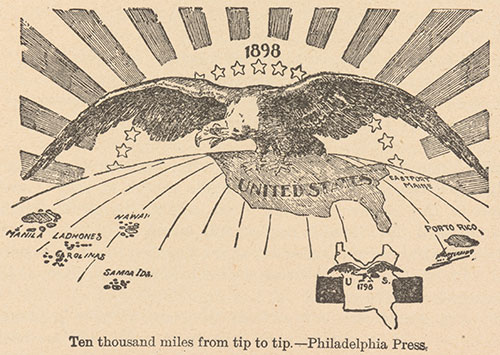
The bald eagle represents the reach of the United States from Puerto Rico to the Philippines.
For historic contrast, a smaller map of the United States is pictured on the bottom right showing the scope of the United States 100 years earlier.
"School Begins", 1899
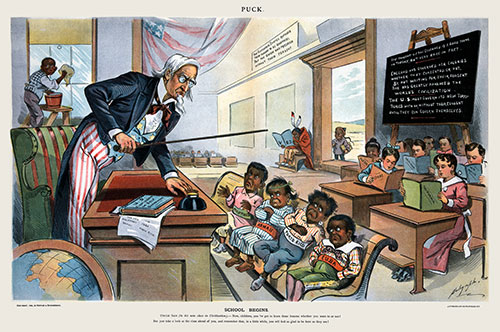
Uncle Sam lectures four children labeled Philippines, Hawaii, Puerto Rico and Cuba, who are sitting in front of children with books labeled with U.S. States.
In the background, a Native American holds a book upside down, a Chinese boy stands in the doorway, and an African American washes the window.
"Prosperity at home, prestige abroad", between 1895 and 1900
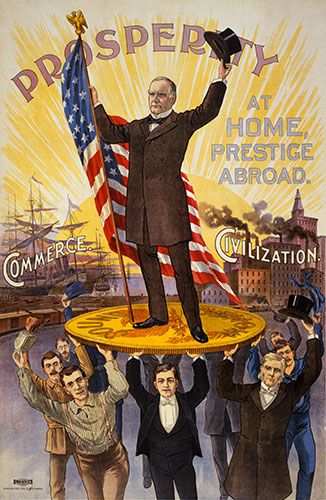
In this campaign poster, President McKinley is standing on a gold coin with the inscription "sound money" in front of examples of things that made the U.S. great, including commerce (represented by ships) and civilization (indicated by factories).
In the theme, "Prosperity at home, prestige abroad," he promises to continue policies that will increase prosperity and prestige across the globe.
"What the United States has Fought For", 1914
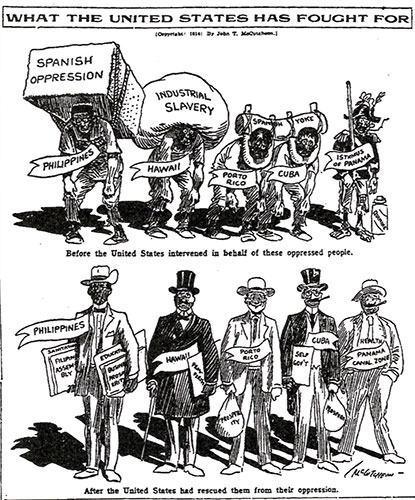
Expressing how the US was presented as liberating former Spanish colonies (15 years after the Spanish-American War), the figures of men with dark complexions represent Philippines, Hawaii, "Porto Rico", Cuba, and Panama.
- The top panel, "Before the United States intervened in behalf of these oppressed people", shows them in rags weighed down by oppressive burdens.
- The bottom panel, "After the United States had rescued them from their oppression", shows them standing tall and healthy in fashionable clothes.
Pro-Expansion Quote
A new consciousness seems to have come upon us - the consciousness of strength - and with it a new appetite, the yearning to show our strength ... Ambition, interest, land hunger, pride, the mere joy of fighting, whatever it may be, we are animated by a new sensation. We are face to face with a strange destiny. The taste of Empire is in the mouth of the people even as the taste of blood in the jungle.
- Editorial, The Washington Post, 1898
Another Pro-Expansion Quote
God has not been preparing the English-speaking and Teutonic peoples for a thousand years for nothing but vain and idle self-admiration. No, He has made us adept in government that we may administer government among savage and senile peoples - He has marked the American people as His chosen nation to finally lead in the redemption of the world.
- Senator Albert J. Beveridge, 1900
"The Battle Hymn of the Republic, Updated" by Mark Twain
Mine eyes have seen the orgy of the launching of the Sword; He is searching out the hoarding where the stranger's wealth is stored; He hath loosed his fateful lightnings, and with woe and death has scored His lust is marching on.
I have seen him in the watch-fires of a hundred circling camps; They have builded him an altar in the Eastern dews and damps; I have read his doomful mission by the dim and flaring lamps– His night is marching on.
I have read his bandit gospel writ in burnished rows of steel: "As ye deal with my pretensions, so with you my wrath shall deal; Let the faithless son of Freedom crush the patriot with his heel; Lo, Greed is marching on!
Expansion
American Expansion
Soon after achieving its manifest destiny, or the belief that the U.S. was destined to control the continent from the Atlantic to the Pacific, to control the continent, Americans became restless and began searching for additional territory outside the borders of the United States. Equipped with a recently expanded military, strong determination, and American support, U.S. forces were ready for a fight.
The U.S. focused its energy on Asian, African, and Pacific island areas that offered potential markets, resources, and strategic military advantages. In the end the United States acquired several new territories that helped to enhance its position and stature in the world, while also entangling it in a new set of foreign alliances and conflicts.
Purchase of Alaska
The first overtures of U.S. imperialism occurred shortly after the Civil War with the acquisition of Alaska. In the 1860s, the purchase of Alaska was highly unpopular; some even called it "Seward's Folly" after the official who proposed the purchase. However, over time public opinion shifted with the majority of Americans endorsing expansionism just a few decades later.
Read Early Stirrings to learn more about the purchase of Alaska.
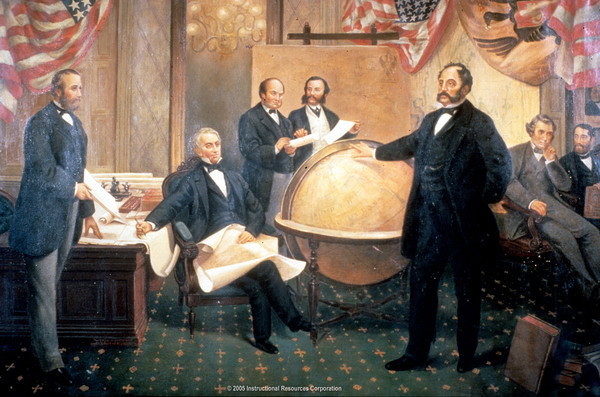
Annexation of Hawaii
The newfound enthusiasm for expansion led to the eventual, and somewhat questionable, annexation of Hawaii in 1898. Despite the efforts of Queen Liliuokalani to stall the annexation, Hawaii was annexed after American plantation owners supported by the U.S. marines took control of Hawaii.
Read Hawaiian Annexation to learn more about how the U.S. acquired Hawaii.